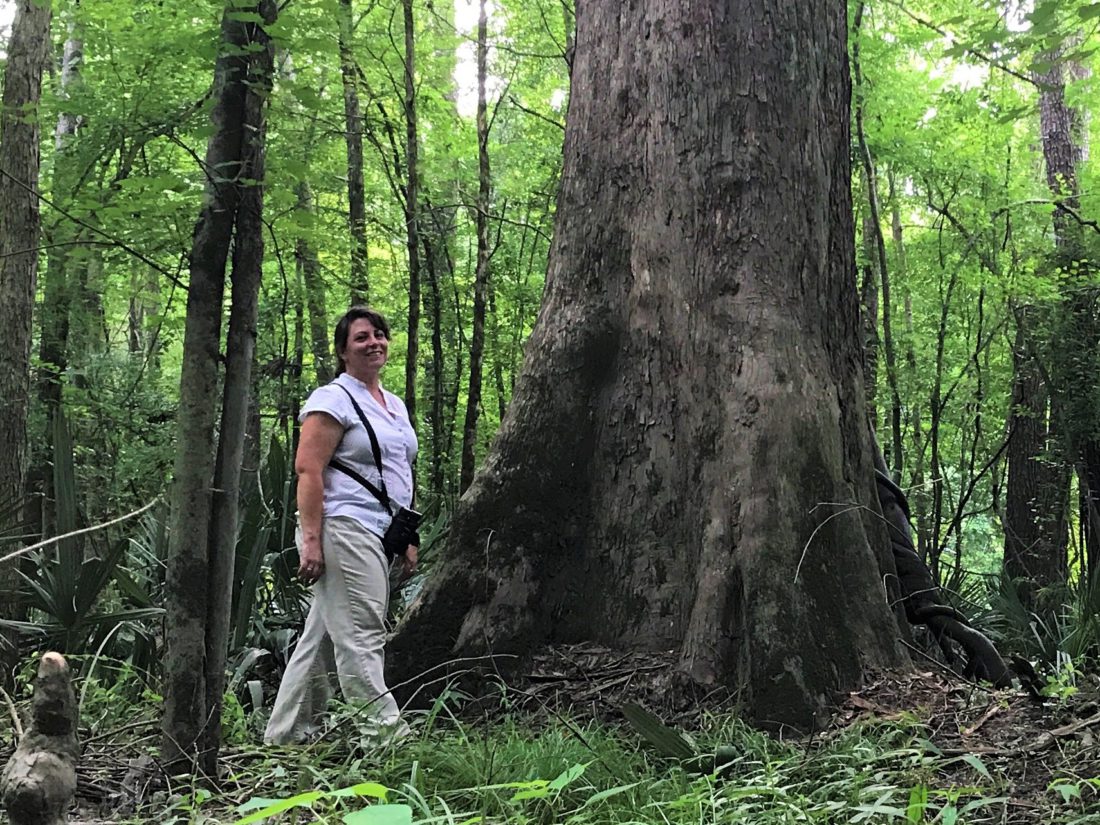The average woodland owner in North Carolina is a retired, white, 65-year-old male. But both in Western North Carolina and across the country, that demographic is changing — fast.
According to the U.S. Forest Service, 60% of the nearly 13.97 million acres of private forestland in North Carolina is owned jointly or individually by women. Nationwide, the percentage of private forests with a woman as the primary decision-maker doubled from 11% in 2006 to 22% in 2013, the most recent period for which data is available.
As their ownership grows, more women are also facing important choices about how to manage, finance and sustain their forest assets. And considering North Carolina’s forest products industry is worth $32.8 billion, much is at stake in the paths they choose.
Yet, as is the case for many historically male-dominated industries, there’s a significant gender gap in forest stewardship. A 2017 report from the Society of American Foresters illustrates that women are less likely than men to harvest timber, manage wildlife, participate in landowner assistance programs and take advantage of green certifications and tax programs.
ForestHer NC, a statewide initiative launched in August 2019 by a coalition of state and national conservation groups, aims to bridge that gap. “We are showing women how to see their land as an asset and how to make it work economically and to see that future,” explains Aimee Tomcho, a Burnsville-based conservation biologist for the National Audubon Society and leader of WNC’s ForestHer chapter.
Woodland wisdom
At the crux of the program is a workshop series that covers foundational forestry skills such as encouraging wildlife habitat and battling invasive species. Since ForestHer’s inception, Tomcho reports, more than 700 women across the state and 200 from WNC have participated in those workshops.
“One of the big things we talk about is balancing objectives,” Tomcho explains. “Many folks really enjoy owning land for the aesthetic value and having space around them, but in order to be able to sustain that lifestyle, you do need to be able to take advantage of programs out there that will share that cost.”
The program covers options such as selling timber, seeking tax deferment and participating in cost-share conservation programs. Nonextractive businesses, including vacation rentals and retreat centers, are also on the table.
Mary Vann Johnston, a forestry associate with Asheville-based nonprofit EcoForesters who has presented for ForestHer, believes such education is critical for the region’s female landowners, many of whom have little prior background in forestry. “I’ve spoken with a lot of women in their mid-60s who have recently acquired their family forests,” she says. “Their dad didn’t bring them into the woods. They didn’t learn their tree species or explore all the corners of the property.”
Even for women with early exposure to the woods, Johnston continues, the logistics of forest management can be quite daunting. The decades- or centuries-long life cycles of trees mean that efforts in the present don’t bear fruit for years to come. And the more timely pressures of taxes, maintenance and development offers can quickly become overwhelming.
Johnston highlights a few of these challenges: “Who do you call to help you write a forest management plan that’s going to take all of your objectives into account and really listen and understand where you’re coming from on this? What is the capacity for logging? How do you get paid if your forest does get logged? What does stumpage mean?”
Rooted together
To help landowners talk through their decisions, ForestHer workshops have previously invited local representatives from conservation organizations to set up tables and directly field questions. Ample time for networking and breakout sessions give participants opportunities to grow their professional contacts and relationships.
But over the past six months, COVID-19 has forced the program into a virtual format, which Tomcho says has been less than ideal. “The emphasis of the workshop is to form community and sit with each other, and that’s lost in virtual communication,” she explains. “We hope to go back to in-person workshops as soon as we can.”
Nevertheless, ForestHer has soldiered on to bring women landowners together online. An Oct. 8 event focused on the impacts of invasive plants and strategies for native plant landscaping. Subsequent workshops are scheduled for Thursday, Nov. 12, and Thursday, Dec. 10; more details and registration information are available through the N.C. Wildlife Resources Commission at avl.mx/8l3, email at ForestHerNC@gmail.com or Facebook and Instagram.
“I really believe that creating this community of women will change the way conservation happens across our land,” Tomcho says. “I’m hoping that this core group of women — and it keeps growing — that we start to communicate with one another about what we know and what we want to know and work to achieve that.”




Hello!
I am interested in communicating with others who are navigating the process of timber harvesting on small ( 25 to 75) acreage in western North Carolina in 2020 and past 2 years.
SL